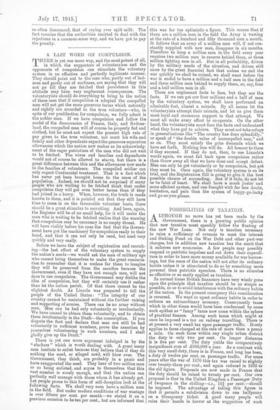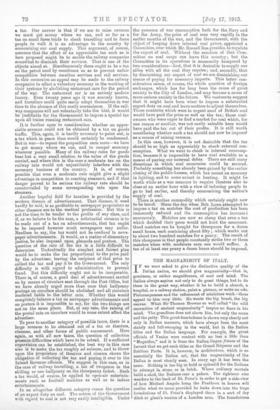POSSIBILITIES OF TAXATION. A LTHOUGH no move has yet been made
by the -Government, there is a growing public opinion that now taxation must speedily follow the floating of the new War Loan. Not only is taxation necessary to raise a, sufficiency of revenue to meet the interest and Sinking Fund ou the War Debt and other post-war charges, but in addition new taxation has the merit that it enforces new economies. A few people may possibly respond to patriotic impulses and out down their expendi- ture in order to have more money available for war borrow- ings, but the mass of the nation will not alter its ordinary habits unless it is stimulated to do so by something more personal than patriotic speeches. There is no stimulus so effective or so easily applied as taxation.
In normal times British financiers have very wisely gone upon the principle that taxation should be as simple as possible, so as to avoid interference with the ordinary habits of the nation. In the present emergency this consideration is reversed. We want to upset ordinary habits in order to enforce an extraordinary economy. Consequently taxes which in other times would have been condemned by some such epithet as " fancy" taxes now come within the sphere of practical finance. Among such taxes which might at once be imposed is a tax on railway travelling. There is at present a very small tax upon passenger traffic. It only applies to fares charged at the rate of more than a penny a mile. On such fares within any single urban district the duty is only two per cent. On longer distances it is five per cent. The duty yields the comparatively insignificant sum of £300,000 a year. As a contrast with this very small duty, there is in France, and long has been, a duty of twelve per cent. on passenger traffic. For some years after the war of 1870 this tax was raised to slightly over twenty-three per cent., and again reduced in 1892 to the old figure. Proposals are now made in France that the duty should be raised to twenty per cent. Our own proposal is that in the United Kingdom a Passenger Duty of twopence in the shilling—i.e., 16 per cent.—should be imposed. The advantage of taking this figure is that it permits a subdivision down to one halfpenny on a threepenny. ticket. A good many people will raise their hands in horror at the suggestion of such a tax. Our answer is that if we are to raise revenue we must get money where we can, and so far as a tax on small fares tends to check travelling and to force people to walk it is an advantage to the country by economizing our coal supply. This argument, of course, assumes that the effect of an appreciable tax such as is here proposed might be to enable the railway companies somewhat to diminish their services. That is one of the objects aimed at. Simultaneously there ought to be a tax on the petrol used by omnibuses so as to prevent unfair competition between omnibus services and rail services. In this connexion an appeal may be made to the railway companies to effect a voluntary economy in the working of their systems by abolishing restaurant cars for the period of the war. The restaurant car is an entirely modern luxury. Even twenty years ago it was scarcely known, and travellers could quite easily adapt themselves in war time to the absence of this costly convenience. If the rail- way companies will not voluntarily take the hint, it would • justifiable ustifiable for the Government to impose a special tax upon all trains running restaurant cars.
It is further open to consideration whether an appre- ciable revenue could not be obtained by a tax on goods traffic. This, again, it is hardly necessary to point out, is a tax which in peace time would certainly be condemned. But in war—to repeat the proposition once more—we have to get money where we can, and to compel economy wherever possible. Many of the railway rates for goods bear but a very small relation to the value of the goods carried, and where this is the case a moderate tax on the railway rate would not unjustifiably interfere with the necessary business of the country. It is, of course, possible that even a moderate rate might give a slight advantage in competition to coasting steamers, and if that danger proved to he serious the railway rate should be countervailed by some corresponding rate upon the steamers.
Another hopeful field for taxation is provided by the modern disease of advertisement. That disease, it need. hardly be said, is as profitable to newspaper proprietors as other diseases are to the medical profession. But this is not the time to be tender to the profits of any class, and if, as we believe to be the case, a substantial revenue is to be made out of a tax on advertisements, that tax ought to be imposed however much newspapers may sutler. Needless to say, the tax would not be confined to news- juper advertisements. It would, as a matter of elementary stice, be also imposed upon placards and posters. The question of the rate of the tax is a little difficult to determine. Undoubtedly the simplest and fairest plan would be to make the tax proportional to the price paid by the advertiser, leaving the recipient of that price to collect the tax and pay it to the Government. The only difficulty is with regard to administration to prevent fraud. But this difficulty ought not to be insuperable. There is, of course, a good deal of advertisement carried on by means of circulars sent through the Post Office, but we have already urged more than once that halfpenny postage on circulars should be abolished and all circulars rendered liable to the letter rate. Whether this would completely balance a tax on newspaper advertisements and on posters it is impossible to say, for the two things are not on the same plane. But, at any rate, the raising of the postal rate on circulars would to some extent affect the advertiser.
To pas. to another category of possible taxes, there is a large revenue to be obtained out of a tax on theatres, cinemas, and other forms of public amusement. Here again, as with all new taxes, the question of collection presents difficulties which have to be solved. If a sufficient supervision can be established, the best way in this case also is to make the tax roughly ad valorem, and to throw upon the proprietors of theatres and cinema shows the obligation of collecting the tax and paying it over to the Inland Revenue officials. We suggest in this case, as in the case of railway travelling, a tax of twopence in the shilling or one halfpenny on the threepenny ticket. Such a tax would, of course, be applied to open-air entertain- ments such as football matches as well as to indoor entertainments.
In an altogether different category comes the question of an export duty on coal. The action of the Government with regard to coal is not very easily intelligible, Under the pressure of war consumption both for the Navy and for the Army, the price of coal rose very rapidly in the earlier months of the war, and the Government, with the object of keeping down internal coal prices, appointed a Committee, over which Mr. Russell Rea presides, to regulate the export of coal. Without the sanction of that Com- mittee no coal cargo can leave this country ; but the Committee in its operations is necessarily hampered by two considerations—first, that it is desirable to supply our allies with all the coal they require ; and, secondly, that by diminishing our export of coal we are diminishing our means of paying for necessary imports. This latter con- sideration raises, of course, the whole question of foreign exchanges, which has for long been the cause of great anxiety to the City of London, and may become a cause of more serious anxiety in the future. We venture to suggest that it might have been wiser to impose a substantial export duty on coal and leave matters to adjust themselves. Those countries which were in urgent need of British coal would have paid the price as well as the tax; those coal- owners who were eager to find a market for coal which, for one reason or another, was not easily saleable here would have paid the tax out of their profits. It is still worth considering whether such a tax should not now be imposed as a means of raising revenue.
In this case, however, it is not desirable that the tax should be so high as appreciably to cheek external con- sumption. What we want to cheek is internal consump- tion, because it is impossible to have coal available as a means of paying our external debts. There are still many directions in which coal economies could be secured. Probably something has already been gained by the earlier closing of the public-houses, which has meant an economy in lighting, and to some extent in heating. It might be worth while as a war measure to require theatres also to close at an earlier hour with a view of inducing people to go to bed earlier, and thereby economizing the nation's supply of coal. There is another commodity which certainly ought now to be taxed. Since the day when Bob Lowe attempted to impose a tax on matches the cost of production has been immensely reduced and the consumption has increase 1 enormously. Matches are now so cheap that even a tax which doubled their price would not hurt the consumer. Good matches can he bought for threepence for a dozen small boxes, each containing about fifty ; which works out to about two hundred matches for a penny. The result of this cheapness is that people constantly strike two or three matches when with moderate care one would suffice. A tax of at least one penny a dozen boxes should be imposed.



































 Previous page
Previous page